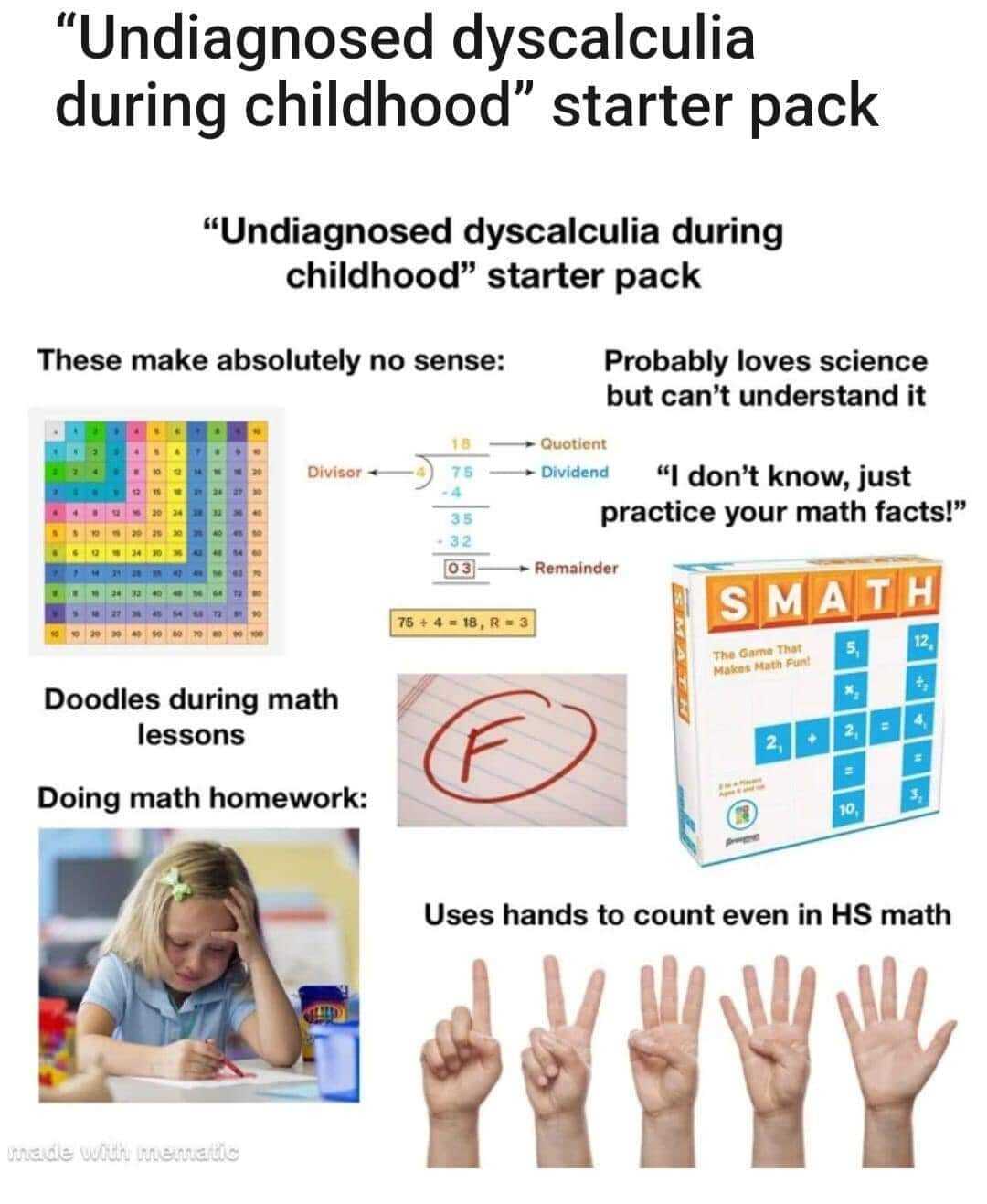- The Neurodivergent Adult's Neurodivergent News
- Posts
- Neurodivergent Adult's Unnamed Newsletter Issue 3, February 26 2024
Neurodivergent Adult's Unnamed Newsletter Issue 3, February 26 2024
ADHD Used to be Useful and We're Unpacking a Dyscalculia Starter Pack
Hello and welcome to Issue 3 of The Neurodivergent Adult’s Unnamed Newsletter! This week we’ll be discussing dyscalculia, loneliness, and a new study about the benefits of ADHD. I do want to warn you in advance that the section on loneliness is a little bit heavy, and does in fact come with a trigger warning.
This week’s newsletter is a little bit shorter as I am currently battling some unusual pain in one of my eyes that makes it impossible to look at a screen for more than a few minutes. Thankfully, I will be seeing a doctor about it tomorrow.
If you’re enjoying this newsletter please consider becoming a Patron on Patreon, where for just $1 a month you can help keep this newsletter going.
Dyscalculia Starter Pack Unpacked

One of the perks of being chronically online is being able to collect a lot of memes. Why is this a perk? Well, memes are where The Neurodivergent Adult started. It’s what I run the youtube channel with at the moment and the majority of my social media posts are memes. I collect so many memes that sometimes, when I’m scheduling posts for Facebook and Instagram they take me by surprise. The Dyscalculia Starter Pack, which I posted to Facebook last week hit me like a ton of bricks.
I’ve always been vaguely aware that Dyscalculia means that you have trouble with numbers. But, I mistakenly believed that it was more like dyslexia where the numbers get mixed up in your head. I don’t have that problem, so…I assumed that dyscalculia wasn’t something I had. But this social media post…a harmless little meme, has made me question what I know about myself once again.
For me, math problems started in the third grade (age 8/9) when I changed schools after moving across town. In my first school we were just finishing up learning long division and had barely touched multiplication, in the other school they were multiplying in double and triple digits. I was immediately behind and though I limped along I never really caught up and I certainly never felt comfortable in math. To this day I struggle with the times tables, which just so happens to be the first part of the dyscalculia starter pack.
The second part of the section titled “These make absolutely no sense” is long division, which makes complete sense to me. (You can probably start to see why I never suspected dyscalculia.)
Probably loves science but can’t understand it. Oooh boy, this fits me perfectly. I had a hard time figuring out what I wanted to do when I grow up, but the earliest thing I can remember wanting to do is be an astronaut. I love space! I LOVE science, and so long as the science doesn’t involve anything beyond very basic math, I’m really good at it. Unfortunately, most science involves math eventually. I ended up settling for Cultural Anthropology in college, if you’re curious. It’s science, but not big on math or memorizing things, both of which are big weak points for me. I enjoy it, but at the time it was very much a case of me settling for what I was capable of doing.
“I don’t know, just practice your math facts!” I’ll be totally honest, I’m not entirely sure what this one means. Is it you as an adult being unable to answer a math problem your child is having? Is it your parent saying that they don’t know? This is certainly open to interpretation. I don’t have children, but I know that once I reached the point in math where I was just learning to solve for X I could no longer rely on my parents to help me with my math homework.
Doodles during math lessons I was a hardcore doodler all through school. It didn’t matter how old I was or what I was learning, I needed to doodle. I would get told not to doodle all the time by teachers. They didn’t seem to understand that doodling helped me focus on listening to them. (Thanks ADHD.) Math wasn’t any different.
F Grade on an assignment Failing math and I have a looong history. Every math class I’ve ever taken since 7th grade (age 12/13) I have had to take at least twice to pass. It was just how it went for me. The first time I took a class I got the basics, like skimming a magazine and reading the headlines and maybe a short article or two. Ultimately, I would fail that class. The second time I took the class though, that’s when I would get a C or a B, still my worst subject, but good enough to pass. In college this got expensive and I never made it past “Freshman Algebra.”
Smath Smath is a math based board game that I had never heard of until I saw it in this starter pack. It appears to be similar to Scrabble, only it’s math instead of words. I can see how it would be a difficult game to play with dyscalculia, especially if you’re playing with peers. But, I look at it now and wonder if it would have been useful to play with my parents or a non-judgemental adult as I was learning math basics. It also seems like it would be a great game for seniors, keeping their brains agile as they age.
Doing Math Homework I spent many nights of my childhood crying over my math homework, especially after my parents could no longer help me. Math homework was basically like torture and not doing it well massively impacted my self-esteem when I was younger.
Uses hands to count even in HS math Please forgive my language for a moment but… bitch, I’m 39 and I STILL count with my hands. Doesn’t everyone? I honestly thought this was a thing that everyone does. Admittedly you don’t see it as often these days since everyone carries a calculator around in their pocket, but…I still count with my fingers.
Why did I share all of this? Well, after posting this I realized that I might have dyscalculia. Getting tested for it at this point in my life seems like a lot of stress and irritation that I don’t need so I probably won’t ever pursue a diagnosis. But, it’s a good thing to know about yourself. Which is why I wanted to share my experiences with you. Because maybe you’re like me and you thought you were just bad at math. If my story can help even one person then I consider it worth sharing.
Autism and Loneliness

Trigger warning: [SH, Su*cide]
As you probably know from all the breathless articles about it, the western world is going through a loneliness epidemic. One in four adults report being lonely and in fact it is so bad that the World Health Organization (WHO) has declared loneliness a global health threat and said that it is having the same impact on our health as smoking 15 cigarettes a day. There is one group of people who are feeling this loneliness even more than others, Autists.
Autistic people are experiencing loneliness at a rate that is 4 times higher than neurotypicals. For autistic people the loneliness often starts earlier with bullying in school, an inability to participate in social activities because of sensory issues, and social anxiety. It then continues into adulthood where the problem is only made worse by the fact that Autistic people are typically unable to get a job or are underpaid leaving them unable to participate in activities that cost money, which these days is pretty much all of them.
66% of autistic people report contemplating suicide at least once in their life, and loneliness is the number one reason for it. Self-harm and suicide rates in autistic people are out of control and something needs to be done about the loneliness that plagues us all. An article I read last week talked about how one way that people are combating loneliness is forming meetups of like minded people. While this is a fantastic idea generally, it doesn’t do much to combat loneliness in autistic people who are unlikely to go to a group.
So, what do we do? Unfortunately, I don’t have an answer. The best I can suggest is reaching out to your autistic friends. Let them know you’re thinking about them and arrange to meet up in a way that won’t cost them money and won’t create a sensory nightmare. If you’re feeling brave, start a local autism social group that meets in the library. Post about it in online spaces where others might see it, like your city’s subreddit, or one of the many local Facebook groups that exists for every town. Just don’t forget to ask the library if you can meet there before you start inviting people. Sadly, I don’t think there is any other way out of this epidemic. No one else is going to help us, we have to help ourselves.
You’ve Got That ADHD Advantage

Many of us have probably heard already that both ADHD and Autism provided advantages in caveman days. Well, this week the evidence for the ADHD advantage became even stronger. New research from the University of Pennsylvania has shown that ADHD may have been beneficial to our hunter-gatherer ancestors.
The study had 457 adults play an online foraging game where they had to collect as many berries as they could in 8 minutes. The only catch was that each time a bush was picked clean fewer berries would come back. Meaning that people could keep going back to the same bushes over and over but get fewer berries each time, or they could go find new bushes to harvest from. The scientists then screened the participants for ADHD-like symptoms. The participants who showed more ADHD tendencies were more likely to move on to another berry patch than those with a lower ADHD score. This also meant that those who potentially had ADHD collected more berries and had a higher score than those who didn’t.
The lead author of the research, Dr David Barack says that the study offers an explanation of why ADHD is so much more prevalent than you would expect it to be, adding that if the traits were truly negative then “you would think that over evolutionary time, they would be selected against.” Basically saying that if ADHD were the disadvantage that it is treated like it is today then we should have evolved to get rid of ADHD. Meaning that those with ADHD wouldn’t have been able to mate and spread their genes.
I would love to see this study done again with people who are diagnosed with ADHD being involved. There’s a big difference between people who display ADHD-like symptoms and people who have ADHD. I would also be curious to find out how many of the participants are gamers, as that could potentially have an impact on the behavior exhibited in the game.
If you’d like to read the results for yourself you can find them here: https://royalsocietypublishing.org/doi/10.1098/rspb.2022.2584
That’s all for this week sadly, but I hope you enjoyed it and I hope you got something from it. Once again, please consider becoming a patron of the newsletter!
Thanks for reading, don’t forget to have some water!